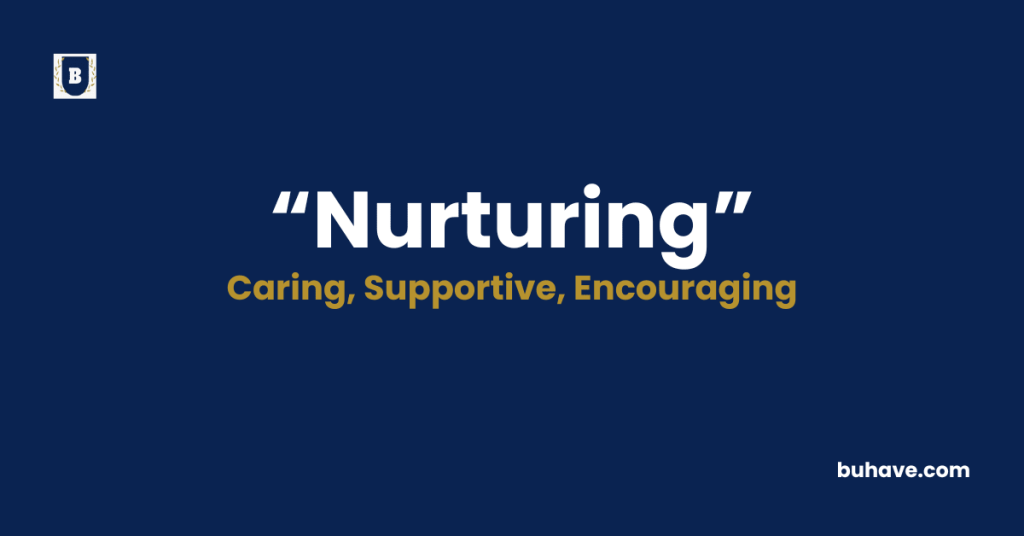The word ‘Nurturing’ (Adjective) describes someone or something that provides care, support, and encouragement to help others grow, develop, or thrive. In this guide, you’ll learn the full definition, synonyms, antonyms, etymology, and real-life examples of how to use ‘Nurturing’ correctly in sentences.
Nurturing Explained in Depth
A complete and detailed guide to the word Nurturing including meaning, definition, examples, etymology, synonyms, and antonyms.
Meanings of Nurturing
The word nurturing refers to the action or quality of giving care, support, and encouragement in a way that helps someone or something grow and develop. It goes far beyond simply maintaining basic needs. A nurturing person or environment focuses on emotional growth, mental support, and gentle guidance. Whether it’s a parent raising a child, a teacher fostering curiosity in students, or even a community supporting each other, nurturing describes the active, consistent involvement in the development of others.
What makes nurturing special is the emotional investment involved. It’s not just about giving someone food or shelter it’s about listening, understanding, and inspiring them. The word often carries a warmth and softness, suggesting kindness, patience, and intentional care. Nurturing behavior promotes not only survival but flourishing.
Whether it’s a nurturing environment at work, a nurturing mentor, or a nurturing friendship, the idea is always about encouragement, trust, and personal growth over time.
Definition
Nurturing refers to the act or quality of providing support, care, protection, and encouragement to help someone or something grow, thrive, and reach their potential. It’s about being intentionally caring, patient, and invested in another’s well-being, whether physically, emotionally, or mentally.
For example, a nurturing teacher doesn’t just teach lessons; they also create a safe space for students to express themselves and ask questions. A nurturing environment isn’t just organized it’s filled with positivity, acceptance, and support. The word is often associated with emotional intelligence and kindness, suggesting that nurturing helps create stronger, more confident individuals or communities. Whether in relationships, education, parenting, or leadership, nurturing is the key to long-term growth and success.
Etymology
The word “nurturing” stems from the base word “nurture,” which has roots in Latin and Old French. Here’s a breakdown of its historical development:
- Latin: From the Latin word nutrire, meaning “to nourish, feed, or support.”
- Old French: The Latin evolved into Old French as nourrir, and then nurture, used to describe care and upbringing.
- Middle English: The word entered Middle English as nurturen or nourturen, meaning to raise, foster, or nourish.
The suffix “-ing” is added to the root “nurture” to create a present participle or adjective, which gives us “nurturing.” Thus, the word literally means “providing nourishment or support continuously.” While the original Latin focused on physical nourishment, over time the meaning broadened to include emotional and mental support as well. Today, nurturing describes not just feeding and protecting, but also loving guidance, emotional support, and developmental care across many areas of life.
Example Sentences
- She has a nurturing personality that makes everyone around her feel safe and valued.
- The school strives to create a nurturing environment for students to explore their creativity.
- His nurturing nature helped his younger siblings succeed in school and life.
- The nurturing atmosphere in the office boosted morale and productivity.
- Parents play a nurturing role in shaping their children’s emotional and mental well-being.
Nurturing Synonyms
- Caring
- Supportive
- Compassionate
- Kind
- Encouraging
- Protective
- Fostering
- Gentle
- Loving
- Affectionate
Nurturing Antonyms
- Neglectful
- Indifferent
- Harsh
- Cold
- Abandoning
- Uncaring
- Hostile
- Insensitive
- Withholding
- Unkind
FAQs about Nurturing
Here are some frequently asked questions (FAQs) about the word “Nurturing”
-
What does “nurturing” mean in everyday language?
It means giving consistent care, support, and encouragement to help someone grow or improve emotionally, mentally, or physically.
2. Can nurturing describe both people and environments?
Yes, people like parents or teachers can be nurturing, and so can environments like classrooms, homes, or workplaces.
3. Is nurturing the same as just taking care of someone?
Not exactly. Taking care focuses on basic needs, while nurturing adds emotional support, encouragement, and long-term growth.
4. Can nurturing be taught or learned?
Absolutely. Nurturing is a skill that involves empathy, patience, and intentional care, and anyone can develop it through practice.
5. Is nurturing only for children?
No, adults, pets, ideas, talents, and relationships can all benefit from nurturing support and care.
6. Why is nurturing important in relationships?
Because it helps build trust, emotional safety, and mutual growth. It makes people feel valued and supported.
7.Can a leader be nurturing?
Yes, nurturing leaders guide with care, encourage growth, and create supportive environments for their teams to thrive.
Explore more N words:
Positive words that start with N
Negative words that start with N
Adjectives words that start with N
Nouns that start with N
Verbs that start with N

















